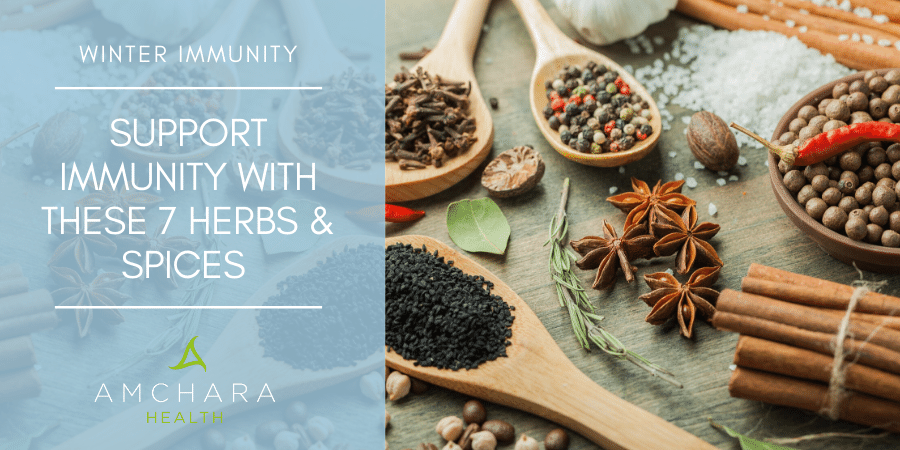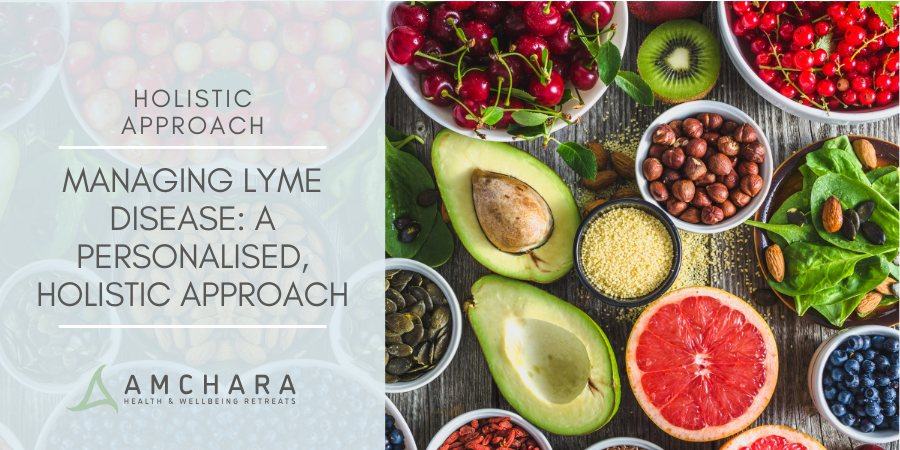Topics Covered in this article:
For hundreds of years, herbs and spices have been used to help maintain a healthy immune system and potentially minimise your risk of illnesses, including viral infections.
We’re dedicated to providing you with both insightful information and evidence-based content and in this article we take a look at the evidence behind 7 herbs and spices that may support your immune system during this challenging time.
1. Echinacea
One of the most well known immune supportive herbs, echinacea has been used traditionally for centuries. Echinacea may stimulate the production of immune cells that are the first line of immune defence against infections. It has direct antiviral and antimicrobial effects and is an excellent antioxidant.
A 2015 meta-analysis of randomised controlled trials involving echinacea found that there was a reduced risk of recurrent respiratory tract infections, such as the common cold, in those taking echinacea (1). Individuals with a higher susceptibility, including reduced immunity or suffering from stress, showed a 50% reduction in the recurrence of respiratory tract infections.
Echinacea may be taken preventively over the winter and also at the first sign of an infection.
2. Pelargonium
Pelargonium is a member of the geranium family and has a long history of use in South Africa. Pelargonium has antimicrobial activity against a range of organisms, including viruses, and can interfere with the replication of viruses; this prevents the virus from increasing in numbers and therefore helps to reduce infection. Studies show viruses affected by pelargonium include seasonal flu viruses, the parainfluenza virus and the coxsackievirus (2).
Pelargonium also influences the secretion of secretory immunoglobulin A (SIgA), a key antibody offering defence on mucus membranes such as those in the respiratory tract or the gut lining.
A pharmaceutical preparation of pelargonium is licensed in Germany for the treatment of bronchitis and acute respiratory tract infections. Studies show pelargonium has a favourable impact on the common cold and can significantly reduce the severity of symptoms as well as shorten the duration of the condition (3).
3. Black elderberry
Traditionally used by native Americans for treating fever, black elderberry (Sambucus nigra) is a fruit containing many beneficial compounds. These include powerful antioxidants like anthocyanidins and flavonoids like quercetin. Black elderberries have a very high ORAC (oxygen radical absorbance capacity) score, meaning it has great antioxidant capacity and can help protect against free radicals.
Black elderberry has been shown to have several modes of action and can direct the immune system to respond effectively during an infection. During the initial phases of an infection it may increase the production of immune messengers that activate an immune response. It also has direct antiviral effects (4).
Research shows patients with flu who took black elderberry extract had a reduction in both duration and severity of symptoms (5).
The effects of black elderberry may be significant in the post-infective stage, making it a useful option for dealing with the winter bugs and getting back to full health.
4. Rhodiola rosea
This adaptogenic herb assists the body in adapting to changes such as in times of stress. It has anti-fatigue and antioxidant properties and contains many beneficial compounds including polyphenols that may support the immune system.
As well as being thought to support resilience to stress and therefore improve immune functioning, rhodiola also stimulates vital immune cells, required for a healthy immune response.
Intense exercise is known to suppress immune functioning and increase susceptibility to infections. A 2015 study in marathon participants showed that supplementing with rhodiola affected viral replication and reduced susceptibility to infections (6). These findings indicate rhodiola may have a role in protecting individuals who are more susceptible to infections and particularly those under stress.
5. Ashwagandha
Ashwagandha (Withania somnifera) is a traditional Ayurvedic herb also known as Indian ginseng. A known adaptogen, like rhodiola, and containing over 35 active compounds, it has a long history of use for stress, fatigue, inflammation, pain and low mood.
Ashwagandha has antibacterial properties – the use of a combination of ashwagandha and other herbs, in cases of tuberculosis, reduced fever and coughing and improved breathing and body weight compared to standard pharmaceutical treatment only (7). Cell based studies indicate it also has antiviral properties against several different viruses.
The use of ashwagandha during stressful times or over the winter may aid in immune function and stress resilience.
6. Ginseng
Ginseng refers to several varieties of herb that have all been used in traditional medicines. Varieties include American Ginseng (Panax quinquefolius) and Asian Ginseng (Panax ginseng). It is rich in compounds called ginsenosides – it is thought some of the health benefits arise from these. Siberian ginseng is not a true ginseng as it contains different compounds.
Ginseng is classed as an adaptogen and helps the body adapt and respond to challenges. It shows specific benefits for the immune system and enhances secretion of immune messengers that direct the immune response.
Ginseng is also known to enhance the activity of specific white blood cells called macrophages – this means the macrophages are more able to ‘engulf’ and ‘mop up’ invading microbes or toxins and debris. In a clinical trial with 20 healthy adults, the administration of oral ginseng extract improved macrophage activity (8).
Research in cells indicates ginseng may have an influence on microbes and may prevent microbes from entering cells, therefore reducing infection. Studies suggest ginseng may be a beneficial herb for preventing flu infections, due to the fact that it influences several areas of immunity (9).
Ginseng given alongside a flu vaccination may enhance the production of antibodies specific to the virus, therefore giving an enhanced response. A study in 227 volunteers showed a reduced incidence of flu and colds in those taking ginseng and the antibody response to flu vaccine was far greater compared to the control group (10).
7. Olive leaf extract
The leaves from the olive tree (Olea europaea L.) are well known to have antioxidant properties and have been used traditionally for many health issues. Olive leaf is rich in many plant polyphenols and one of the main active constituents is thought to be oleuropein.
Olive leaf extract has been shown to have immune supportive actions and some antimicrobial effects against specific microbes. It may be useful for infections such as H. pylori and even MRSA (11).
Infections of the common cold and flu may also be targeted with olive leaf extract. Research indicates olive leaf extract increases the ‘mopping up’ of viral infections and may shorten the duration of an infection.
A small study conducted with high school students showed that although olive leaf extract did not prevent infection it did reduce the signs and symptoms and led to fewer sick days (12).
Takeaway
Strengthening your immune system with herbal support may help to combat bugs and viral infections. If you are taking medication, then before taking any supplements you should check with your doctor to ensure there are no risks of potential contraindication.
Other preventive measures to support your immune system include regular hand washing, ensuring exposure to natural daylight and fresh air and reducing stress to support overall immunity.
If you would like to know more about strengthening your immune response, or want to tackle a particular health issue, a one to one consultation with a Personalised Health practitioner can help to guide you on specific positive steps to take.
This doesn’t need to be the end of the article. With your comments we’d love to continue the conversation.
Did you find this article useful?
Let us know your top tips to support immunity.
Read this next:







